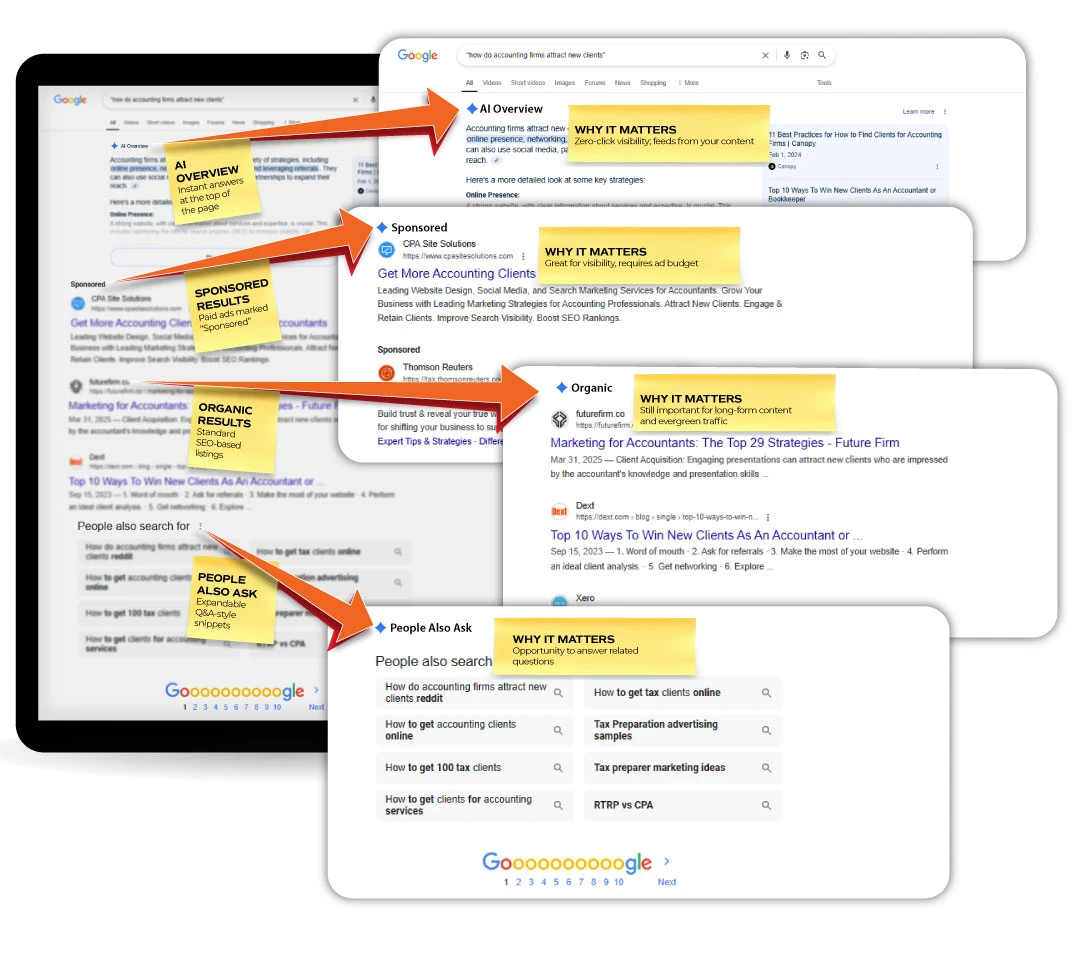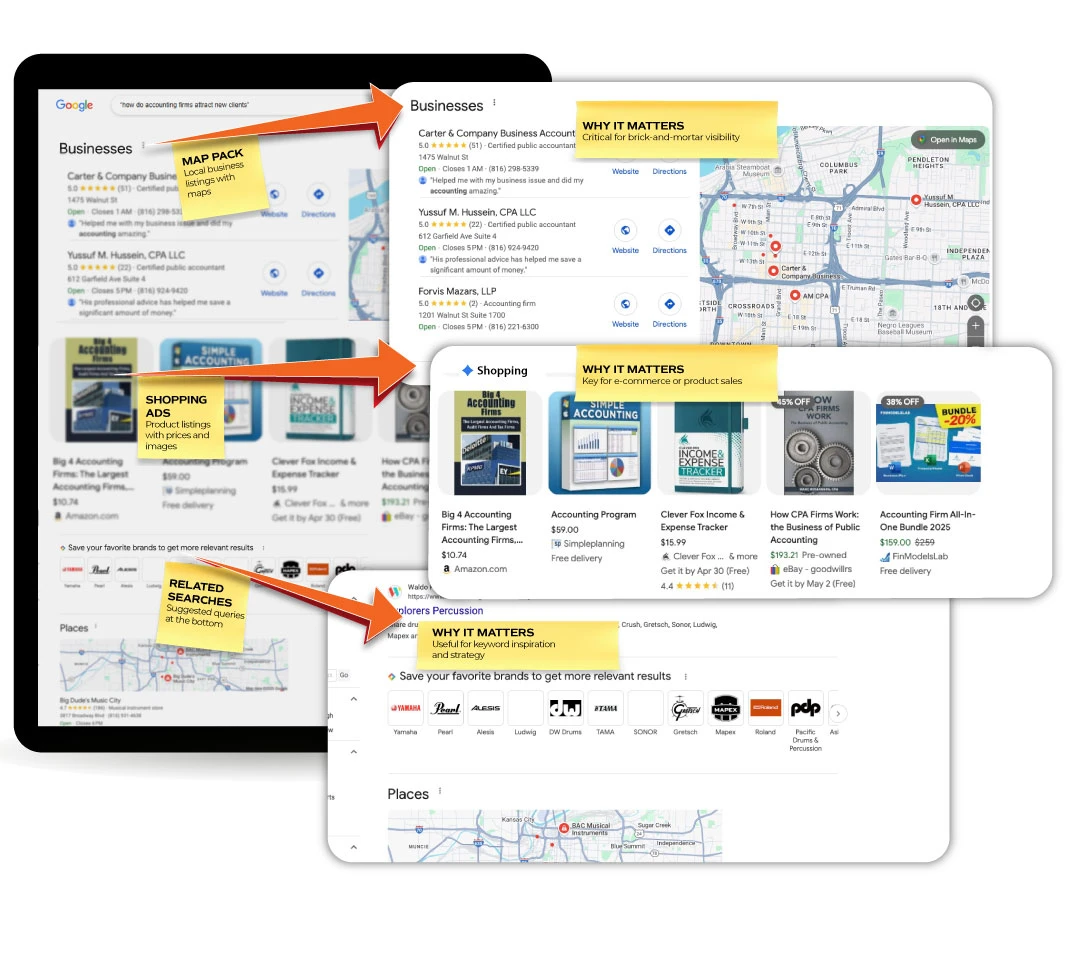Picture this: You’re rushing to find the perfect vendor for a project that’s already behind schedule. You hit Google with a question — not just keywords, but a real, human question — and boom, an answer appears above the regular search results. You didn’t even need to click.
Welcome to the new era of search: AI-powered, context-aware and lightning fast.
Whether you’re a small business owner or steering the ship at a mid-sized company, this shift matters. The way people search — and how businesses are found — has changed. And if your marketing strategy doesn’t keep pace? You’re invisible.
What Is AI Search?
Traditional search was like playing “find the matching words.” You typed “marketing agency in Kansas City,” and Google matched results with those exact words.
AI search plays a smarter game. It doesn’t just look for matches — it understands what you mean. It’s powered by natural language processing (NLP) and machine learning, which means it can interpret questions the way humans do.
That’s why you can now ask full-blown questions — even conversational ones — and get meaningful answers instantly. It’s not magic. It’s just really smart software.
What’s Happening Behind the Scenes?
AI search is like the best intern you’ve ever had — fast, smart and always learning. It doesn’t just scan for words; it interprets intent using:
- Semantic search: Looks for meaning, not just words
- Language models: Understand sentence structure and phrasing
- Behavioral data: Learns what users typically mean based on past behavior
Put it like this, it’s not just about what’s said — it’s about what’s meant.
How It Thinks: Search Algorithms in Action
Imagine you’re trying to get across town during rush hour. Do you take the scenic route or the shortcut? AI uses algorithms like A* (A-Star) to choose the fastest, most relevant path to the right answer — just like GPS for your search.
The Big Players in AI Search (And Why You Should Care)
| Platform | What It Does Best | Ideal For |
| Google Gemini | AI Overviews, integrated search answers | B2B & consumer info |
| Bing Copilot | Conversational AI + Microsoft 365 tools | Productivity, research |
| ChatGPT with Browsing | Summarized web answers with sources | Research, writing, Q&A |
| Perplexity | Concise, cited summaries | Competitive research |
| You.com and Andi | Niche, privacy-focused tools | Developers, creators |
Whether you’re vetting vendors, researching trends or writing content, these tools are reshaping how we do business online.
How AI Search Impacts SEO and Content Strategy
You may have noticed: clicks are down, but visibility still wins.
Those AI summaries (the zero-click answers at the top of the page) mean users may never visit your site — but your content still feeds those answers.
“That’s where the search engine’s AI attempts to tell you the answer… with a link icon that will take you to the answer source.”
— Marketing Tip | Episode 71 of Small Business Miracles Podcast
That quote nails it. AI search still depends on high-quality, optimized content to deliver those instant results. So even if users aren’t clicking, your brand visibility is thriving — if you’ve done the work.
What Does the Search Engine Results Page (SERP) Actually Look Like?
Here’s a quick rundown of the modern SERP layout — because understanding where your business can appear helps you plan smarter SEO and content strategies. Let’s take a look.

Quick look at the modern SERP layout — know where your business can show up to plan smarter SEO and content strategies.
Example 1:

Another look at the modern SERP layout — know where your business can show up to plan smarter SEO and content strategies.
Example 2:
The modern SERP is no longer a flat list — it’s a multi-format, AI-curated space. If you’re only optimizing for traditional organic listings, you’re missing out on valuable real estate.
Content Marketing for AI Search
To win in this new landscape, your content needs to be:
- Structured clearly: Think headings, bullet points, short paragraphs
- Supported by metadata: Behind-the-scenes tags help search engines “read” your pages
- Built on authority: Trust, credibility, and accuracy now impact both AI and traditional SEO
If you’ve ever asked yourself, “What would an AI pull from my site?” — that’s the new golden question.
Why Backlinks Still Matter in an AI-First World
Even with AI-powered summaries, search engines still rely on authoritative sources to fuel their answers. That means backlinks from trusted local organizations, vendors, associations, or content partners are more important than ever.
Looking for opportunities to grow your site’s authority?
Start by collaborating with industry associations, podcast partners, or regional groups. Each backlink strengthens your credibility — and boosts your chance of being selected as an AI answer source.
The Future of Search Is Generative
Say goodbye to typing keywords and skimming pages. AI search is now:
- Conversational: Like talking to a smart assistant
- Efficient: Cuts hours of research to seconds
- Integrated: Think of Microsoft Copilot helping you write proposals, or ChatGPT drafting content briefs
So… Is Your Business Ready?
Ask yourself:
- Can your website content be easily summarized by AI?
- Do your blogs or landing pages clearly answer real business questions?
- Are you optimizing for both humans and AI bots?
- Does your current marketing partner bring this up at all?
If you’re not sure — or if the person who should be thinking about this isn’t — now’s the time to forward this blog.
Let’s Make AI Search Work for You
At EAG — we’re your outsourced marketing experts. That means we don’t just write blogs and fix websites. We future-proof your business with:
- Strategic, scalable marketing solutions
- Proven expertise in SEO and AI-driven content
- Insightful storytelling that connects with people and search engines
Even if we’re not the right fit, we’ll point you to someone who is. Because the right solution is the one that works best for your business.
Want to see if your website is ready for the new world of AI search? Let’s talk.
